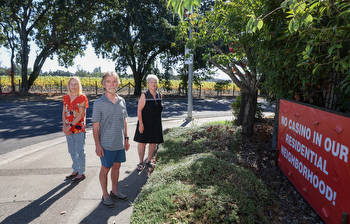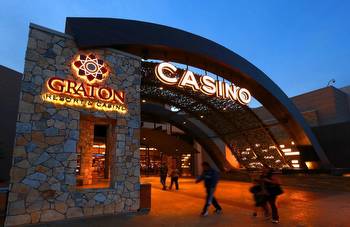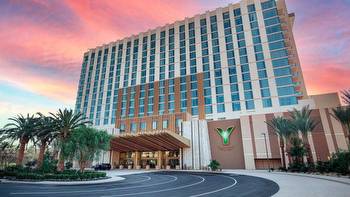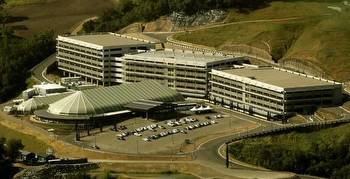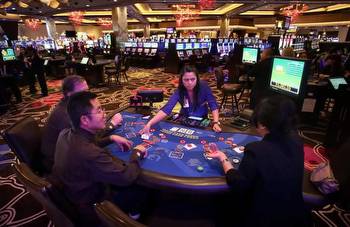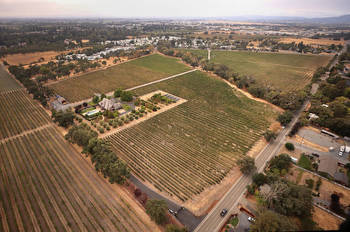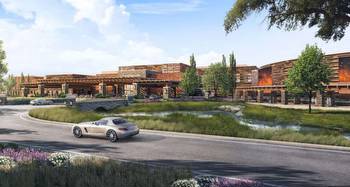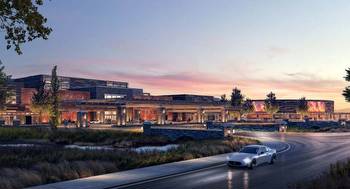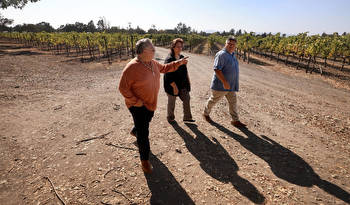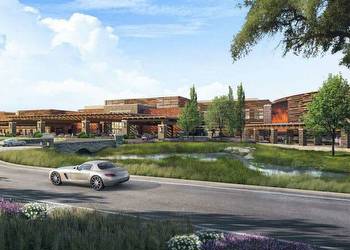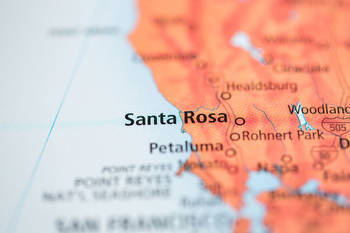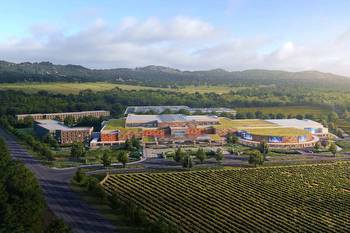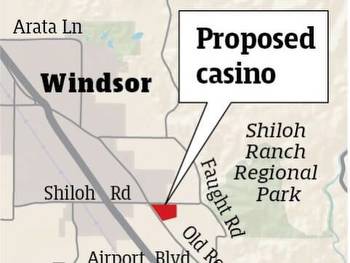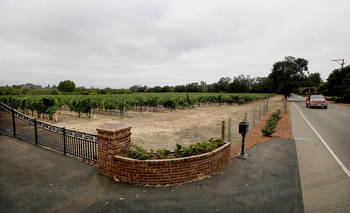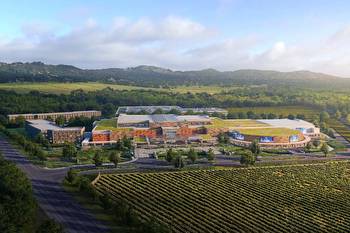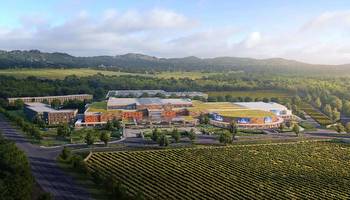North Bay tribe proposes $600M casino project

The Koi Nation, a federally recognized tribe based in Sonoma County, has unveiled plans to turn a 68-acre vineyard southeast of Windsor into a $600 million casino resort, one of the largest of its kind in Northern California.
The 90-member Pomo tribe intends to turn the land about a half-mile from Shiloh Ranch Regional Park into the Shiloh Resort & Casino. Pending necessary state and federal approvals, it’s likely to take four years before the resort would be built and opened, tribal representatives said.
The tribe acquired the property at 222 East Shiloh Road from private owners this month for $12.3 million. Until then, most of its members lived in Sonoma County but didn’t have land of their own.
Although local officials expressed surprise and opposition to the massive casino development plan, they acknowledged that the tribe likely would have broad authority over how to develop its newly acquired property if the federal government grants the property sovereign status.
Koi Nation leaders, who went from being private citizens in Sonoma County to a force to be reckoned with in just a day, said they will seek input from community members and local elected leaders about their project.
The expected economic and community benefits of the resort would buoy the tribe’s members — many of whom struggle to afford living in the North Bay — but also provide a boost for county residents, they said.
“This day is a long time coming,” Koi Nation Chairman Darin Beltran said. “Our main objective is to become economically independent.”
The project would be the third Las Vegas-style gambling venue in Sonoma County, rivaling the Federated Indians of Graton Rancheria casino outside Rohnert Park, which has the largest gaming floor in the Bay Area plus a 200-room hotel. It opened in 2013.
The Dry Creek Rancheria Band of Pomo Indians owns and operates the smaller River Rock Casino near Geyserville. It opened in 2002.
The Koi Nation’s planned development would include 2,500 slot and other gaming machines, a 200-room hotel, six restaurant and food service areas, a meeting center and a spa. The intent is an energy-efficient resort blended with the natural landscape. The entire development would stretch across 1.2 million square feet.
Approval of the casino resort ultimately rests with state and federal officials. Still, Koi Nation leaders said they already have reached out to Sonoma County supervisors to discuss their plans. Board Chair Lynda Hopkins recognized county officials may have little say over land-use decisions for the project under federal rules.
“Counties are pretty much cut out of the process,” Hopkins said.
Impacts on water resources, traffic, wildfire risk and public safety are all key concerns — and many of the same issues fueled opposition to development of Sonoma County’s two existing tribal casinos in the past two decades.
Supervisor James Gore, whose district includes Windsor and the casino’s proposed home just outside of the town, said he’s personally opposed to casinos.
He noted county officials reached an agreement with the Lytton Band of Pomo Indians in 2015 to refrain from building a large planned casino on their sovereign land in Windsor or anywhere else in the county. Unlike the Koi Nation, however, the Lytton tribe already owns a casino — in San Pablo in Contra Costa County.
Gore said he expects Windsor residents and town council members will be “vociferously loud” in objecting to the Koi Nation’s casino resort plan, concerned about traffic congestion, environmental impacts and crime.
Dino Beltran, Koi Nation vice chair, said the tribe expects questions and concerns from the community.
“We’re going to be very open-eared to what people have to say,” Beltran said. “We’ll have the community outreach and deal with what folks’ concerns are.”
The Koi Nation on Wednesday also submitted plans in Washington, D.C., to place the 68-acre Shiloh Road tract into a trust held by the federal government, which would allow the tribe to exercise its sovereignty over the land.
The announcement and filing with the U.S. Department of the Interior’s Bureau of Indian Affairs starts the clock on what will be a long approval and construction process that could take four years, said Sam Singer, a spokesman for the tribe and well-known Bay Area public relations manager.
The tribe hopes to begin construction on the resort in one to two years, and is expected to take another two years until it’s ready to open, Singer said.
Federal authorities are expected to begin an environmental review of the Sonoma County land and open a public comment period on the project in 60 to 90 days, according to tribal leaders.
To open the casino, the Koi Nation must also negotiate with California’s governor for a tribal gaming agreement, which must be ratified by the state Legislature and be approved by the U.S. Department of the Interior, according to the California Indian Gaming Association.
State Sen. Mike McGuire, D-Healdsburg, said he was just learning about the casino resort proposal on Wednesday, but found it “deeply concerning” because of its size.
“Sonoma County doesn’t need another casino and I oppose any new gaming outlets,” McGuire said. “While I honor and respect tribal sovereignty, this is not the right plan for the north county.”
U.S. Rep. Jared Huffman, D-San Rafael, helped author the bill that allowed the Lytton tribe to take its land west of Windsor into trust with the federal government, advancing a tribal housing project and other development plans — but not a casino. Huffman said he likely would oppose the Koi Nation’s resort project and that there was no guarantee the tribe would successfully navigate the complicated process to secure federal and state approvals for their casino.
“It is one thing to say you have acquired a piece of property and roll out drawings and blueprints,” Huffman said. “Actually getting that land taken into trust and getting the contracts and approvals to start gaming is a whole different story. It’s just hard to do that if everyone around you opposes it.”
Windsor Councilwoman Debora Fudge said the Koi Nation’s announcement was particularly frustrating given the time Sonoma County and Windsor officials had spent negotiating with the Lytton tribe to give up any plans for a local casino. Through spokesman Doug Elmets, the Lytton Band of Pomo Indians declined to comment.
Fudge is opposed to the planned Shiloh casino resort development. Given Windsor’s history of opposing casinos, she was not too surprised Koi Nation tribal leaders didn’t alert Windsor’s leaders about the project’s unveiling.
“I get it,” she said. “They seem to have hired people at the top of their game in terms of public relations and so they’re expecting opposition.”
The vineyard property slated for the project is in unincorporated Sonoma County between Windsor and Santa Rosa.
The vineyard’s entrance on Wednesday was framed by a wrought iron gate with a tree-lined driveway leading to a country villa. Though the area is dominated by agriculture, a subdivision in eastern Windsor with dozens of large homes sits just across East Shiloh Road to the north.
To the west, on the western side of Old Redwood Highway, is a large mobile home park. San Miguel Elementary School is about a 10-minute walk to the south, off Faught Road.
And to the east is the 850-acre Shiloh Ranch Regional Park, a popular destination for hikers with 8 miles of winding trails leading through the Mayacamas Mountains.
The Koi Nation plans to seek out private investors to help finance the massive development, said Singer, the tribe’s spokesman. He said there’s a “great deal of interest in this project,” though he declined to share the names of any investors.
The Koi Nation anticipates that an undetermined portion of the Shiloh casino resort’s revenue will be shared with the broader community through the support of local organizations.
Once built and fully operational, the resort is expected to employ more than 1,100 full-time workers.
The Koi Nation is one of the remaining groups of Pomo people who have been without their own land for most of the last 150 years. Ancestors of the Koi Nation were part of the Southeastern Pomo people who lived on the island Koi on Clear Lake, according to the tribe’s website.
In 1916, the United States government attempted to relegate the tribe to a small rancheria near Clearlake. But the Bureau of Indian Affairs deemed the land uninhabitable. The tribe then moved to Sebastopol and Santa Rosa, and Sonoma County has remained its spiritual and political center.
Although uninhabited, the Koi Nation’s Lower Lake Rancheria was terminated in 1956 by federal authorities who mistakenly ended the federal government’s relationship with the Koi Nation.
For the next 50 years, the United States continued to deny the Koi Nation recognition as a tribe, until a federal court in 2019 restored its sovereignty and ability to establish a tribal land base.
The court’s ruling “paved the way” for the tribe to acquire the Shiloh Road land and take the first step to get approval to build the casino resort, Singer said.
“With this land and the Shiloh Resort & Casino, we are taking long overdue steps to preserve our cultural and historic integrity and secure a brighter future for coming generations,” said Beltran, the Koi Nation chairman.








